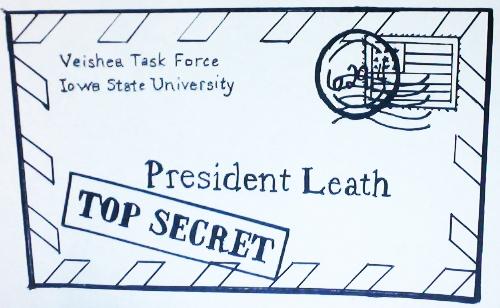Editorial: Task force’s secrecy harms ISU, community

Illustration: Sara Madison/Iowa State Daily
The Veishea Task Force will be delivering its final recommendation to President Leath on July 11. Its final meeting was closed after 20 minutes to allow the members to privately converse, indicating they might not agree with their public opinions.
July 9, 2014
Veishea is the oldest student-run tradition at Iowa State. For more than 90 years, the students of Iowa State have scheduled, planned and celebrated Veishea. So why now are ISU students being left in the dark about the future of the celebration?
While the majority of the Veishea Task Force meetings have been open to the public, its recommendations and final report about the future of Veishea seem to be secret. It is a shame that just when the Veishea Task Force is making its decisions, it excludes the public, including students, from the conversation.
The task force’s last meeting was June 26, and all meetings were open to the public up until that date. But the public was only allowed in on the first 20 minutes of the final task force meeting. The Veishea Task Force decided to hold the meeting in private to discuss draft documents which are exempt from public records law.
“Veishea Task Force is not a governing body as defined in the Iowa open meetings law, and its meetings are not required to be open,” said Tom Hill, senior vice president for student affairs and chairman of the task force during one of its meetings.
Although this may be the case, many concerned students, faculty and community members have been attending the meetings up until this point and deserve the knowledge of recommended changes to the tradition.
It is a bit unnerving to hear that Hill said the meeting was going to be held in private because “the need was there in order to give the task force a full opportunity to share their views freely and fully on the draft recommendation.”
This statement leads meeting attendees to believe that what has been talked about in past meetings may not be how the task force actually felt. Why would Veishea Task Force members be able to voice their opinions only in private when they have been speaking in public meetings since the riot took place?
Since the Veishea Task Force does not want the public to know what happened in the meeting, does this mean the decisions being made are going to be strongly discouraged by the public? If this is the case and the final recommendation is going to be the opposite of what the public would like it to be, it does not make sense to have had any public meetings at all.
None of the Veishea Task Force meetings were required to be open to the public, and we are grateful that the previous meetings and open forums were available to the public, but there needs to be consistency. There should not be some meetings open to the public in order to try to please those attending while potentially hiding some less pleasing decisions behind closed doors.
In addition to the closed meeting and unavailable draft documents, the task force also had an executive committee which meant regularly outside of task force meetings. This group was charged with deciding how a new event should be shaped and how it will serve the new list of purposes.
However, nowhere on the Veishea Task Force website does it discuss members, meeting times and other business of the executive committee. If this committee has so much responsibility, shouldn’t the public have access to information about it?
During the Veishea Task Force meeting June 19, the task force created a subcommittee to come up with a plan to handle student behavior and the party culture of Veishea. Similar to the executive committee, there is no information on the task force’s website about the subcommittee other than a video of the June 19 task force meeting.
The Veishea Task Force’s final recommendations are not set to be submitted to President Steven Leath until July 11. Let it be known, however, that students, faculty and members of the Ames community are concerned about what is happening to Veishea and they deserve to follow along with the decision process every step of the way.
















